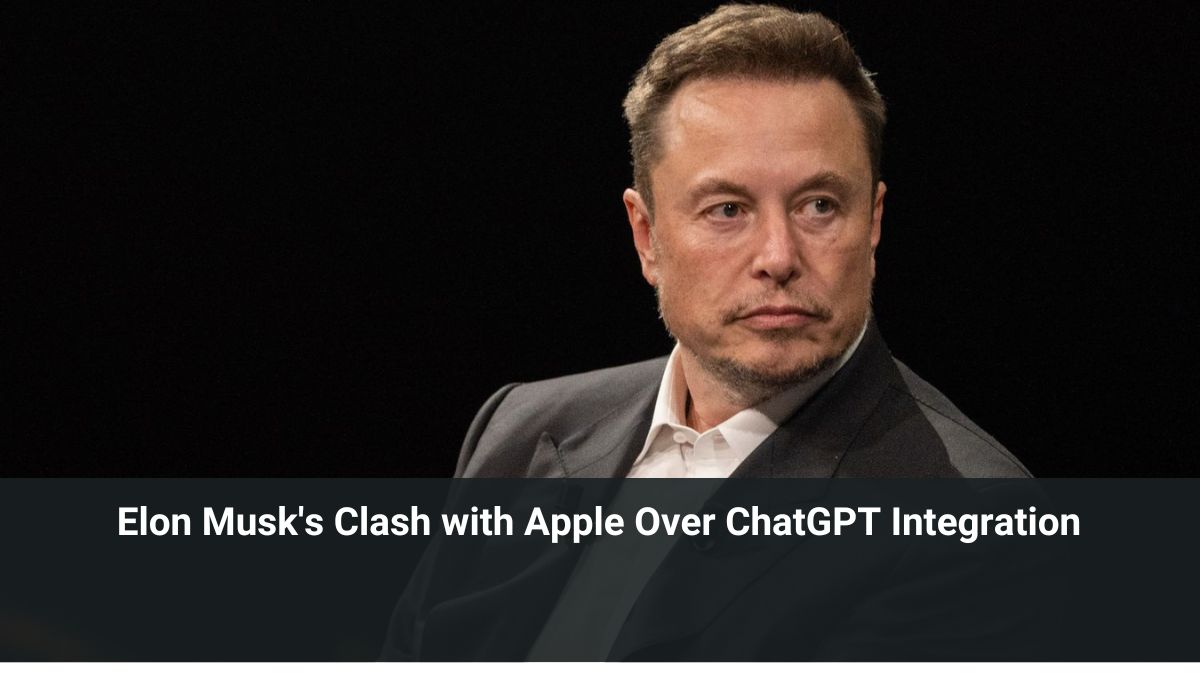AI
Elon Musk’s Clash with Apple Over ChatGPT Integration

A Battle of Tech Titans Looms
In a surprising twist, Elon Musk, the visionary entrepreneur behind Tesla, SpaceX, and xAI, has issued a stern warning to Apple. He threatens to ban iPhones and other Apple devices from his companies if the tech giant proceeds with its recently announced plans to integrate OpenAI’s ChatGPT into its operating system.
This bold move has ignited a firestorm of controversy, pitting two titans of the tech industry against each other. On one side stands Musk, a fierce advocate for artificial intelligence (AI) and a staunch believer in safeguarding user privacy. On the other, Apple, a company renowned for its cutting-edge products and commitment to innovation.
The Root of the Conflict
At the heart of this clash lies a fundamental disagreement over the implications of Apple’s decision to incorporate ChatGPT into its ecosystem. During the recent Worldwide Developers Conference (WWDC) 2024, Apple unveiled plans to seamlessly integrate OpenAI’s renowned language model into various aspects of its operating system, including Siri and writing tools.
While Apple and OpenAI have assured users that their data and queries will be handled with utmost care, Musk remains skeptical. In a series of impassioned posts on X (formerly Twitter), he expressed grave concerns about the potential privacy implications of such a deep integration.
“If Apple integrates OpenAI at the OS level,” Musk warned, “Apple devices would be banned from his businesses, and visitors would have to check their Apple devices at the door, where they’ll be ‘stored in a Faraday cage.'”
Misunderstanding or Legitimate Concern?
Musk’s vehement opposition seems to stem from a perceived misunderstanding of the relationship between Apple and OpenAI. While the two companies have emphasized that users will be asked for permission before any data is shared with ChatGPT, Musk appears to believe that OpenAI’s capabilities are deeply ingrained into Apple’s operating system, posing a potential threat to user privacy.
In one of his posts, Musk exclaimed, “It’s patently absurd that Apple isn’t smart enough to make their own AI, yet is somehow capable of ensuring that OpenAI will protect your security & privacy!”
This sentiment reflects a deep-seated concern that Apple may not fully comprehend the inner workings of OpenAI’s models and, consequently, cannot guarantee the safety of users’ personal data.
A Question of Trust and Control
At the crux of Musk’s argument lies a fundamental belief that OpenAI’s capabilities should remain confined within a dedicated app, rather than being integrated into the core operating system. This stance echoes a broader debate surrounding the balance between innovation and user privacy in the ever-evolving tech landscape.
Musk’s apprehension is not entirely unfounded. As AI systems become more advanced and ubiquitous, ensuring transparency and user control over personal data becomes paramount. The fear of AI models “hoovering up” sensitive information without user consent is a legitimate concern that must be addressed.
However, Apple has been steadfast in its commitment to user privacy, emphasizing that users will maintain control over when and how ChatGPT is utilized. Additionally, the company has stated that requests and information shared with ChatGPT will not be logged, further safeguarding user privacy.
A Clash of Visions or a Misguided Outcry?
As the dust settles on this heated exchange, it becomes clear that Musk’s outcry may stem from a deeper philosophical divide regarding the role of AI in our lives. While Apple embraces the integration of AI capabilities into its core offerings, Musk appears to favor a more cautious approach, advocating for greater compartmentalization and user control.
Alternatively, Musk’s response could be interpreted as a strategic move to promote his own AI ventures, such as xAI’s Grok, by capitalizing on public concerns surrounding privacy and data security.
Regardless of the underlying motivations, this clash between tech titans has ignited a crucial dialogue about the ethics and implications of AI integration. It serves as a reminder that as technology advances, we must remain vigilant in protecting user privacy and fostering an environment of transparency and trust.
The Road Ahead
As this controversy unfolds, it is evident that the tech industry must navigate the delicate balance between innovation and responsible AI integration. Collaboration, open communication, and a commitment to ethical practices will be crucial in shaping the future of AI and its integration into our daily lives.
While Musk’s concerns may resonate with some, it is important to approach this issue with a level head and a willingness to engage in constructive dialogue. Only through thoughtful discussion and a shared understanding can we ensure that the remarkable potential of AI is harnessed responsibly, protecting user privacy while driving innovation forward.
In the end, this clash between Elon Musk and Apple may be a catalyst for broader conversations about the role of AI in our society. As we forge ahead into an increasingly AI-driven world, it is incumbent upon us all – tech giants, entrepreneurs, and consumers alike – to engage in these critical debates and shape a future where technological advancement and ethical considerations coexist harmoniously.
